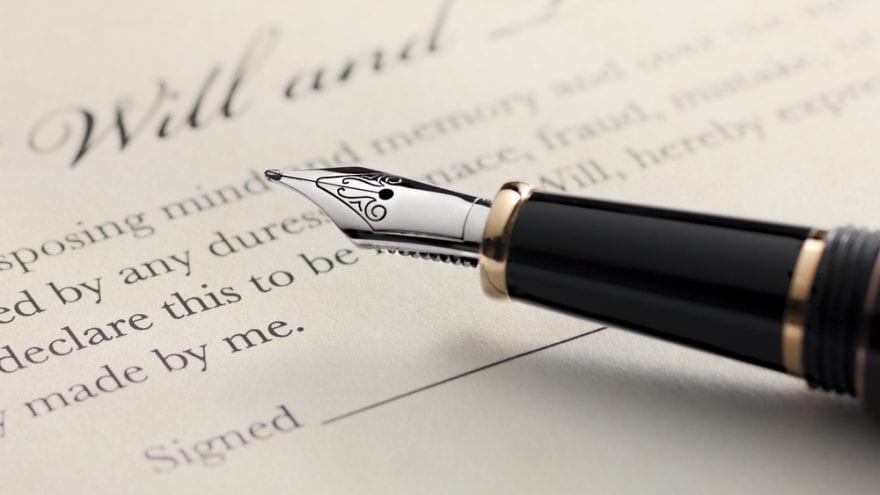How to Make a Will Without a Lawyer

A will is a written legal document in which a person, known as the testator, sets forth his or her wishes on how an estate’s assets are to be distributed, who will serve as guardians of any minor children, and other issues. A will also should appoint an executor(s) to administer the estate.
In a survey taken in 2019, 53% of people who did not have a will said the reason they didn’t have a will was the difficulty of finding an attorney they could trust. However, you don’t need a lawyer to prepare a will for you. You can prepare a will yourself, and there are plenty of resources, especially online, to guide you. You can save money this way and still have peace of mind knowing that your estate plan is in place. Below are the steps to help make a valid will without a lawyer.
Make a List of any Assets and Liabilities.
The first step is to know what you own and owe. Since the main focus of a will is the distribution of your assets, it’s important that you first compile a list of them. Your executor will have to pay any debts before distributing assets, so you also should make a list of them.
Understand the Legal Requirements of Your State and Know any Necessary Language and Features.
A state might accept a holographic, or handwritten, will or a will without witnesses, at least under some circumstances. While many states accept different types of will, you should strive to meet the requirements of a testamentary will. Meeting these requirements make it less likely that someone will challenge a will and that a court will declare it to be invalid.
The requirements of a testamentary will differ from state to state. Witnesses are required. But some states require two witnesses while others, such as Vermont, require three. Some states require that the signatures of you and the witnesses be notarized, while others don’t. Know your state’s requirements.
A will should state that it is the most current and updated version. It should include a statement revoking any previous versions and affirm that the current version is the only valid will
Create a Basic Template Yourself or by Using an Online Service.
You aren’t required to use the same format as most other wills, but it will make things easier for your executor and reduce the potential the will won’t be considered valid. It is best to have the will typed or computer-generated. The various online will-making services make this easier by establishing the format and allowing you to print the final version to be signed. Most of these services guide you through the process by having you answer a series of questions. The service uses the answers to generate the final will.
Decide on Your Beneficiaries.
A beneficiary is a person who receives property through the will. The transfer or gift of property is known as a bequest. You need to identify the people (or institutions, such as charities) you wish to receive bequests from your estate and determine the amount of the bequests.
Most people name spouses, children, close family members, or close friends as their beneficiaries. Many include one or more charities as well.
A specific bequest is when an individual(s) receives a specific asset or a specific amount of money. For example, a will might say “My brother Joseph is to receive $5,000 cash.” Or a will might say “My sister Jane is to receive my diamond bracelet.”
You don’t need to make specific bequests. Some people want to remember friends or family who aren’t members of the immediate family. Other people know that a particular piece of property would be meaningful and cared for by a certain person.
The estate that is left after any specific bequests are made is known as the residual estate.
Bequests from the residual estate tend to be more general and nonspecific. For example, a standard residual bequest is to provide that all the children receive equal shares of the estate. Another frequent provision is to provide that the surviving spouse receives the bulk of the estate (say 80%), but the adult children receive the remaining portion.
It’s a good idea to name contingent beneficiaries who will inherit if the primary beneficiary is deceased at the time the will is probated. For example, a will can say that the estate will be inherited by the spouse but the children will each receive equal shares of the estate if the spouse has passed away.
Generally, if a minor is a beneficiary, the child cannot legally own the assets until reaching the age of majority. Either a guardian must be appointed to handle the child’s assets or your will can create a trust in which the trustee will manage the assets until the child reaches an age named in the trust agreement.
Name Guardians for Your Children.
When a testator has minor children, the will should designate one or more individuals who will serve as guardians for the children if both parents are deceased. It is also recommended to select alternate guardian choices, in case the first choice is unable to assume the responsibility. If the will does not name guardians, the probate court or another government agency will choose the guardians.
Appoint one or More Executors of the Estate.
An executor manages the estate through the probate process and eventually distributes the estate to the beneficiaries. The testator can name anyone as executor. The only requirements are that he or she is an adult and a U.S. citizen or permanent resident. Careful thought should be given to the choice of executor. The executor must be willing to take on the role and capable of doing the job. Often a trusted family member or friend is appointed, though some people appoint a professional, such as the family estate planning attorney or accountant.
Some people appoint more than one executor. This is especially wise when the estate is valuable or complicated. Multiple executors also can ensure the work is done as promptly as possible and is done fairly.
The will should state whether the executor will be compensated from the estate.
Include Additional Instructions in a Letter.
Many people include a letter of instructions to the executor. The letter isn’t part of the will and has no formal legal authority. Some letters give detailed information about assets, where they are located, and suggestions on how they should be managed. The letter also might explain certain terms of the will in more detail. The idea is to make the executor’s job easier and answer any questions people might have about the estate or will.
Some letters are more personal and sentimental. They include wishes for family and friends, personal philosophy, and words of wisdom.
Sign the will in Front of Witnesses.
Make sure to finish the will by signing it in front of the number of witnesses required by your state. A will isn’t valid until it is executed, which has to be signed by the executor in front of witnesses. Some states even have requirements that only instructions appearing before the signature are valid. Anything following the signature isn’t valid.
As mentioned, the minimum number of witnesses varies from state to state but usually is two. The witnesses don’t read the will and aren’t saying that they know or understand the contents. The witnesses are attesting that they saw the testator sign the document and that he or she appeared to know what he was doing and not be under duress or coercion.
The witnesses must be adults and be disinterested, meaning that they are not beneficiaries under the will.
Most states do not require the signature to a will to be notarized. However, it might be a good idea to have the signatures notarized to ensure it is valid in all states.
Store the will in a Safe Space and Update it When Needed.
Be sure to store the original copy of the will where it is reasonably safe from being damaged by fire or natural disasters and from being stolen. A waterproof and fireproof safe is ideal. Many states require that the original signed copy be submitted for probate. Copies aren’t valid under most circumstances.
Be sure the key individuals know where the original and any copies are stored and how they can get access to them. A will isn’t much good if you stash it in a file or drawer and no one knows about it.
Additional copies of a will might be useful, though they should be stored separately from the original. Don’t circulate copies of your will. If you revise the will later, there will be multiple versions of your will in existence. That could cause a dispute as to which is the valid one.
A will should be updated after any major life changes of the testator, the family, and beneficiaries, such as marriages, divorces, births, and deaths. Significant changes in the assets owned by the testator or the value of the assets also should prompt a review of the will. Some people change some of the objects of their affection, and that necessitates a revision of the will. Of course, changes in the tax law and other laws might make a revision advisable.
Even if you can’t identify any of these events as having occurred, it’s a good practice to review the will every few years and update it for any necessary changes.
Valuable contributions to this summary of “How to Make a Will Without a Lawyer” were made by Bob Carlson, editor of the Retirement Watch financial advisory service and chairman of the Board of Trustees of Virginia’s Fairfax County Employees’ Retirement System with more than $4 billion in assets.
Katie Kao is an editorial intern with Eagle Financial Publications.




